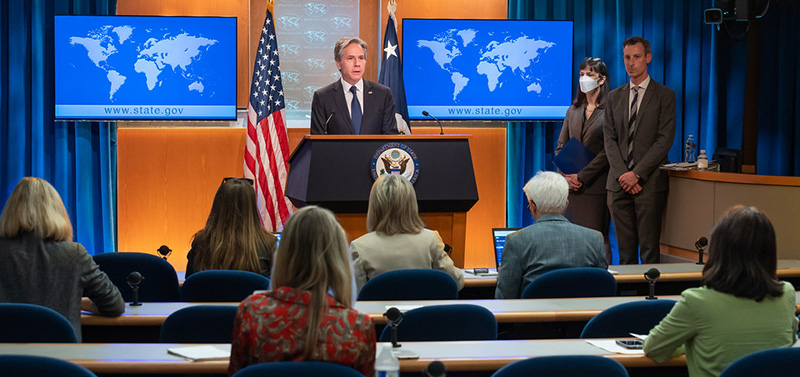Washington, D.C. – “The Chinese Government continues to commit genocide and crimes against humanity in Xinjiang against predominantly Muslim Uyghurs, among other minority groups, to erode fundamental freedoms and autonomy in Hong Kong, and to carry out systematic repression in Tibet,” said Antony Blinken, United States Secretary of State on April 12, 2022.
The US State Department released its 2021 Country Reports on Human Rights Practices: China (including Hong Kong, Macao, and Tibet) on April 12, 2022. The report’s section on Tibet notes significant human rights abuses faced by Tibetans inside Tibet under the Chinese government.
Secretary Blinken addressed to media on the release of the 2021 Country Reports on Human Rights Practices, on April 12, 2022, and said “The report also shows that the United States is concerned not only with civil and political rights, but also economic, social, cultural rights. That means, for example, affirming that promoting access to education and health services, including for reproductive health, is just as critical to advancing human rights as defending the freedom of expression and assembly.”
“The Chinese Government continues to commit genocide and crimes against humanity in Xinjiang against predominantly Muslim Uyghurs, among other minority groups, to erode fundamental freedoms and autonomy in Hong Kong, and to carry out systematic repression in Tibet,” the secretary said.
"Arbitrary arrest and detention remained serious problems. Legal safeguards for detained or imprisoned Tibetans were inadequate in both design and implementation. Detainee’s ability to challenge lawfulness of detention before a court, does not exist in the Tibetan Autonomous Region (TAR) or other Tibetan areas," the report stated.
"Public security agencies are required by law to notify the relatives or employer of a detained person within 24 hours of their detention but often failed to do so when Tibetans and others were detained for political reasons," the report said.
"Authorities electronically and manually monitored private correspondence and searched, without a warrant, private homes and businesses for photographs of the Dalai Lama and other forbidden items. Police routinely examined the cell phones of TAR residents at random stops or as part of other investigations to search for “reactionary music” from India or photographs of the Dalai Lama. Authorities also questioned and detained some individuals who disseminated writings and photographs over the internet or listened to the teachings of the Dalai Lama on their cell phones. Authorities continued to employ pervasive surveillance systems, including the use of facial recognition and smart identity cards," the human rights report stated.
"The TAR regional government punished CCP members who followed the Dalai Lama, secretly harbored religious beliefs, made pilgrimages to India, or sent their children to study with Tibetans in exile," it added.
"Authorities tightly controlled journalists who worked for the domestic press and could hire and fire them based on assessments of their political reliability. CCP propaganda authorities were in charge of journalist accreditation in the TAR and required journalists working there to display “loyalty to the party and motherland"," the report further stated.
"PRC authorities arrested and sentenced many Tibetan writers, intellectuals, and singers for “inciting separatism.” Numerous prominent Tibetan political writers, including Jangtse Donkho, Kelsang Jinpa, Buddha (no last name), Tashi Rabten, Arik Dolma Kyab, Gangkye Drukpa Kyab, and Shojkhang (also known as Druklo)," it said.
"Authorities prohibited domestic journalists from reporting on repression in Tibetan areas. Authorities promptly censored the postings of bloggers and users of WeChat who did so, and the authors sometimes faced punishment. Authorities banned some writers from publishing; prohibited them from receiving services and benefits, such as government jobs, bank loans, and passports; and denied them membership in formal organizations ," the report stated.
"Authorities in Tibetan areas regularly banned the sale and distribution of music they deemed to have sensitive political content," the report said.
"Even in areas officially designated as “autonomous,” Tibetans generally lacked the right to organize. Persons who organized public events for any purpose not endorsed by authorities faced harassment, arrest, prosecution, and violence. Unauthorized assemblies were frequently broken up by force. Any assembly deemed by authorities as a challenge to the PRC or its policies, for example, to advocate for Tibetan language rights, to mark religious holidays, or to protect the area’s unique natural environment, provoked a particularly strong response both directly against the assembled persons and in authorities’ public condemnation of the assembly. Authorities acted preemptively to forestall unauthorized assemblies," the human rights report stated.
“The reports paint a clear picture of where human rights and democracy are under threat. They highlight where governments have unjustly jailed, tortured, or even killed political opponents, activists, human rights defenders, or journalists, including in Russia, the People’s Republic of China, the Democratic People’s Republic of Korea, Nicaragua, and Syria. They document abuses of peaceful protestors demanding democracy and fundamental freedoms in countries such as Burma, Belarus, Cuba, Hong Kong, and Sudan. They highlight worrying cases of transnational repression – where governments reach across borders to harass, intimidate, or murder dissidents and their loved ones – as exemplified in the dangerous forced diversion by Belarus of an international commercial flight for the sole purpose of arresting a critical independent journalist,” the US State Department stated.


![Tibet has a rich history as a sovereign nation until the 1950s when it was invaded by China. [Photo: File]](/images/stories/Pics-2024/March/Tibet-Nation-1940s.jpg#joomlaImage://local-images/stories/Pics-2024/March/Tibet-Nation-1940s.jpg?width=1489&height=878)
















